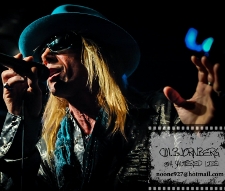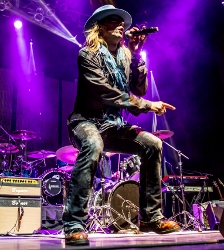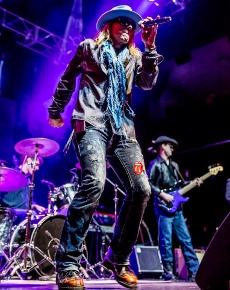
Robert Hamilton
I love Robert Hamilton. He has a big heart and a rocking band called The Hamiltons. I interviewed Robert last year, after the release of The Hamilton’s debut album In Cranford We Trust. That album is dedicated to his childhood friend Cranford Hamilton Nix.
Robert met Cranford in high school, when Cranford came up to Robert and told him he was a star. Robert told him: “What are you talking about? I don’t play anything, and he said, ‘Not yet.’ That started a fast friendship. We started playing some old records from the 50’s, Buddy Holly, Elvis Presley, Bill Haley & His Comets and Eddie Cochran. Then, we graduated to the 60’s, The Rolling Stones and The Beatles. The whole point was to teach me how melodies and music fit together with simple cords. You don’t need to be a Rhodes Scholar to create good music.”
Cranford taught Robert the basic rules of the music game: “We worked for days, weeks and months on these chords and we started writing our own songs. I’m the only one that Cranford ever wrote with, and I’m grateful to this day for his friendship. He brought a lot of bright light to me at a time when there was none.”
Robert still remembers Cranford telling him: “In order to be successful as a songwriter, you have to be true and you have to be an artist. You don’t necessarily have to be the best singer; you just have to write a song that people can relate to. The Hamiltons recently opened for Rick Springfield. Rick was a great, great guy to talk to. His songs are autobiographical, which is why he’s sold 25 million records. Even though he’s no longer in the Top 40, he still makes the rounds, he still tours and he still has avid fans.”
Cranford passed away 13 years ago. In Cranford We Trust was a tip of the cap to Cranford and Robert’s way of saying thank you to his friend: “I took of bunch of old demos, which were on cassette tapes, picked some of his songs and finished them for him. I released In Cranford We Trust on January 17, 2014, on Cranford’s birthday. I released our latest album Angels in Love on January 11, on my birthday.”
 Angels in Love was released to rave reviews. Robert shared some of the great news: “We’ve had a lot of really good press. Shutter 16 Magazine was blown away by it. A local writer, Gary Graff, he reviewed our record, really liked it and did a write up before our CD release party at Callahan’s Music Hall in Detroit, where a lot of national acts play. We sold out and, unfortunately, had to turn people away. Internationally, we’ve had a couple of people add songs off our record to their playlist.”
Angels in Love was released to rave reviews. Robert shared some of the great news: “We’ve had a lot of really good press. Shutter 16 Magazine was blown away by it. A local writer, Gary Graff, he reviewed our record, really liked it and did a write up before our CD release party at Callahan’s Music Hall in Detroit, where a lot of national acts play. We sold out and, unfortunately, had to turn people away. Internationally, we’ve had a couple of people add songs off our record to their playlist.”
The Angels in Love album cover is an ambigram, the same image upside down as right side up, forwards and backwards. The ambigram invokes some 70’s imagery: “The style is what we are going for with this record, rock-and-roll the way it was meant to be. Rock-and-roll that makes you smile when you hear it; rock-and-roll that helps you tap your toe and forget about your problems, even though the singer might be singing about problems.”
I absolutely love the breakout hit single for Since You’ve Been Gone. Jim McCarty’s guitar solo is amazing. I just had to hear that song’s back story: “To clarify, there are two rock greats named Jim McCarty. One plays drums for the The Yardbirds, which is the band that spawned all the English guitar greats, starting with Jimmy Page, Eric Clapton and Jeff Beck. We’re talking about the Jim McCarty who was the original guitar player for Mitch Ryder & The Detroit Wheels. Jim McCarty was friends with Jimmy Hendrix, and Jimmy Hendrix suggested to Buddy Miles that Jim McCarty take his spot in Buddy Miles Blues Express. Later, in Los Angeles, Jim McCarty formed a band called Cactus, which is Eddie Van Halen’s favorite band. He also was in a regional band called The Rockets in the mid 70’s. Even now, all the famous people who pass through Detroit call Jim and want to play with him. I wrote the song Since You’ve Been Gone and I kept hearing Jim McCarty playing on it. I called him and told him that I had this song with his name on it. He came down and I explained that I wanted the Jim McCarty who played in The Rockets. He ripped the guitar. It was like magic and lightening were in a bottle in that room for that hour. He played in the video and he even played at our CD release party. We were really lucky to have him. It was awesome.”
I also can’t sit still when I hear the song Hey Little Girl. I had to know more: “It’s about a girl that steals the guitar from a guitar player in the band. As I reworked the lyrics, I pictured our guitar player, Bobby Black Hamilton, and some of the questionable ladies he’s dated in the past. He and Cranford both have had their guitars stolen before, so I mixed both their stories together. You know, you’re having some fun with this girl you meet at the show, you hang out after the show and you wake up the next day (in true rock star form) to find your guitar is gone. What do you do when you’ve got a gig that night? You scramble, looking everywhere for the girl and the guitar. It’s a really fun song.”
 Robert owns his own label called Soul Fire Records, so I asked him how that business was going: “I built a sound stage and recording studio in a pole barn on my property just outside Ann Arbor, Michigan. There’s a completely furnished one bedroom apartment in there too. I also have a small cottage that can sleep four people. We’ll be able to host about 10 people at a time to do recording. The sound stage doubles as a small private venue for showcasing.”
Robert owns his own label called Soul Fire Records, so I asked him how that business was going: “I built a sound stage and recording studio in a pole barn on my property just outside Ann Arbor, Michigan. There’s a completely furnished one bedroom apartment in there too. I also have a small cottage that can sleep four people. We’ll be able to host about 10 people at a time to do recording. The sound stage doubles as a small private venue for showcasing.”
The Hamiltons kicked off Soul Fire Records. Now, Robert is working on a top secret project: “I’m actually working with some big names in the industry, people who have sold a million records and want to make a new hit record. We don’t have a name for the project yet.”
Robert Hamilton has a vision: “To establish myself as an artist, either with The Hamiltons or with this Soul Fire Records project, so I can open up the door and be able to sign artists. I plan to put money into the artist up front without taking their publishing rights. I will do pre-production for the artist and record the album. I will create a brand for the artist, merchandising, packaging and a logo. Say all that costs $50,000. The deal would be that I would get 50% until they paid me back and, after that, only 10%. I would own none of their publishing. My goal is to create a modern day Motown, where music is all that matters.”
Robert continued to talk about how much his songs mean to him: “Songs are like your kids. Every song is like a child of mine. To sell your kids or what’s a part of you is like selling your soul. I refuse to do that or to ask anyone else to do that.”
In the spirit of artists helping artists, Robert wants to share a recent bad experience with a company that he paid to promote his songs to mainstream radio: “I was recently ripped off by somebody and, unfortunately, there are a lot of these people out there. This guy said he could get us played on mainstream radio. I did an initial search on this company, and it came back OK, so I sent him a bunch of CD’s and a weekly payment. He kept sending me these charts, and it looked like we were trending. I wasn’t selling any more records, so I got suspicious. I found out that the charts were faked. I learned that the industry standard is Billboard. You can be an independent artist and get spun on Billboard, but it takes a lot of work. I want all my independent artist friends to beware.”
As Robert told me, “Hopefully, one step at a time, we’ll meet our goal. I want to give music back to the people, where it belongs. I want to put some light in a dark industry.” Robert, you do good work.
Robert Hamilton’s first Featured Artist interview: https://amusednow.com/blog/robert-hamilton-in-cranford-trust/
The Amused Now Featured Artist Series
 Robert Hamilton, The Hamiltons
Robert Hamilton, The Hamiltons
www.thehamiltonsmusic.com
@Hamiltons4music
Facebook
Google+
Cynthia Kahn, Founder of Amused Now
@Amused_Now
Facebook
YouTube
iTunes
SoundCloud
